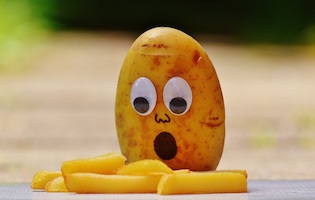 The average family food bill forms a significant part of the weekly budget, and if you waste the food you buy, that simply pushes up the bill.
The average family food bill forms a significant part of the weekly budget, and if you waste the food you buy, that simply pushes up the bill.
Auckland Council has a goal to achieve zero waste by 2040 and is concerned about the amount of food wasted in the city, where statistics say 15,000 loaves of bread are wasted every day. That is apparently enough to cross the Harbour Bridge three times over!
The Council created an event this week to discourage such waste and the Wastewise advisors created ‘compost cookies,’ made from discarded food. Catering students from AUT also put together dishes from food which is frequently wasted.
“Food waste is a massive issue in New Zealand and particularly in Auckland where our wastage is higher than the national average,” says Councillor Penny Hulse, Chair of the Environment and Community Committee.
“The majority of food waste at home can be easily avoided and that’s why we’re encouraging Aucklanders to love their leftovers. It’s easy and there are so many benefits.
Here are a few ideas from their site we can all use, www.lovefoodhatewaste.co.nz
Quick-sale items are great value
When perishable food is a few days from its expiry or best before date, retailers often discount it heavily. If it has a use by date, then you should cook it immediately or pop it in the freezer. Food can safely be frozen up to its best before date.
Most good food makes good leftovers
Use leftover rice in a stir fry, take a small serving of last night’s dinner as lunch or use slightly soft vegetables in stews or soups. Don’t forget about the joy of a leftover toasted sandwich! If you make a recipe intending to have leftovers for lunch the next day, put aside what you need for lunch before you serve the meal. This will ensure that you or your family won’t mistakenly eat what you have planned to last two meals all in one go.
Have a leftover dinner once a week
Plan to have a meal each week where you use up any bits and pieces that are in the fridge, pantry and freezer. It may turn out to be a random mixture of things, but it will save you the cost of another meal and cold be brilliant!
Freeze
If you find yourself making an extra trip to the shop just to buy milk, keep a bottle in the freezer. Is there a great two-for-one special at the supermarket? Freeze the second item until you need it. And, if you find your fruit or vegetables tend to go bad before you can eat them, partially cook them and then store them in the freezer.
Plan your menus
When you do your weekly shop, think about what you’ll be cooking and buy what you need. Use all parts of your fruit and veges – broccoli and cauliflower stalks are edible and are a great way to bulk out a stir-fry. If you are peeling potatoes to make mashed potatoes, roast the peelings in the oven to make a tasty snack.
If you roast a chicken, use the carcass to make stock, rather than buying it. Try to get two meals out of a chicken – shred leftover meat and use it in a frittata for example.
Maximise mince
Make your mince go further by bulking it out with other ingredients. If you are making a Bolognese or burritos you can add in grated carrots or zucchini, chopped celery or mushrooms, or a tin of beans or lentils. This is a great way to use up vegetables that may have gone limp. If you are making meatballs or rissoles, adding breadcrumbs means you’ll get more and will help them keep their shape.
Smart storage
Put your food in the right place so that it doesn’t spoil. Bread should be kept in the fridge or freezer so it doesn’t grow mould. Keep most fruit in the fridge, with just a small selection in the fruit bowl – to prevent over ripening.
If you are interested in finding out how much you could save by minimising waste take this quiz and get started.









Join the Discussion
Type out your comment here:
You must be logged in to post a comment.